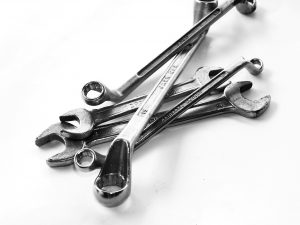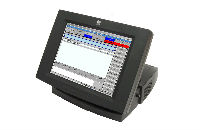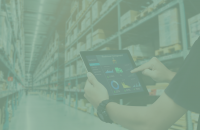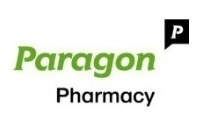Out-of-the-Box vs. Custom vs. Hybrid ERP Software – What’s a Good Fit for My Retail Business?
Buying an Enterprise Resource Planning (ERP) system for a mid-sized retail chain is not exactly easy. Let’s face it – there are a lot of choices out there! So, it helps to narrow them down a little.
As you do your research, you’ll quickly realize that there are three kinds of ERP systems – out-of-the-box, custom and a hybrid that combines the best of both.
With an out-of-the-box ERP system, you generally pay for a pre-built software package – whether its features match your business needs or not. With a customized supply chain management package, you pay more for features that are designed to meet your specific requirements. And with the mix of both, you get a system that works right “out of the box,” while giving you the ability to add or modify certain features to suit your business needs.
So, the question is, which of the three options is better? We’re here to help you decide.
What’s So Great About Out-of-the-Box ERP Software?
 Out-of-the-box ERP software is a system that comes with all the tools, templates and other features built into it from the get-go.
Out-of-the-box ERP software is a system that comes with all the tools, templates and other features built into it from the get-go.
The problem is that these kinds of systems are designed to accommodate as many businesses as possible. As a result, they tend to be 100% generic, meaning that you can’t modify anything in them aside from increasing the number of users. This also means that many of the features in these systems are not tuned to the needs of individual businesses.
It’s an easy system to learn, but it’s unlikely to do everything your particular business requires. It may also have many features your business won’t ever need at all. In other words, a generic system is not designed with you in mind.
So, here’s what you should consider when looking at generic out-of-the-box ERP systems:
- Off-the-shelf systems tend to have a lower upfront cost. However, usually, the initial purchase price excludes fees for upgrades, software support, monthly or annual licensing, per-website or installation licenses and per-seat costs. All of these can inflate your budget to considerably higher levels. Over time, these fees can exceed the costs of a custom solution.
- Process adjustments. Due to the inflexible nature of out-of-the-box software, you may need to change several of your processes to match its operations. This means that you’d have to retrain your staff, which would lead to a slower work rate. It’s also worth considering the opportunity cost of the features you’re not getting with the software.
- Infrastructure requirements. You may need to change your infrastructure to accommodate the software. For instance, you may have to account for new browsers, programming language requirements, rollout challenges and so on.
- Since an out-of-the-box ERP system is not in perfect alignment with your business, it won’t adapt to your growth. Instead, you may eventually outgrow it and render it obsolete.
- Out-of-the-box ERP systems are rarely customizable, and even when they are, customization can be extremely expensive.
- Off-the-shelf ERP software vendors are seldom interested in on-going support. Once you buy the software from them, you’re done. As a result, the only time you’d contact their support is if you need to troubleshoot a problem. This means that you’re likely to interact with a representative from a call center as opposed to a trained software developer.
Overall, out-of-the-box ERP systems are a great fit for small businesses that don’t have too many complex processes or can’t necessarily afford a custom system. If you’re still small, then this is likely your best bet.
What’s So Great About Custom ERP Software?
 With a custom ERP system, you get to decide what individual components should be included. The process of assembling custom ERP software is basically like building your own car or deciding what toppings should go on your pizza.
With a custom ERP system, you get to decide what individual components should be included. The process of assembling custom ERP software is basically like building your own car or deciding what toppings should go on your pizza.
In most cases, a decent customizable system, such as Oracle or SAP, would still have a pre-built base feature package that comprises roughly 20% of it. That leaves 80% of the system in your hands – to be customized however you wish. Many good custom ERP software vendors should be able to examine your business needs and put together a custom package for you, so you shouldn’t feel too intimidated by the process.
With that in mind, here’s what you should consider when looking at custom ERP systems:
- Custom ERP systems tend to cost more upfront than their out-of-the-box counterparts since they need to be assembled before they become operational. Furthermore, additional feature requests and changes are often considered extra. In some cases, you may even need to hire a specialized engineer as part of your team to help you with this, increasing the cost. The upside of the higher cost is that your company will be able to use every single feature on offer, maximizing the system’s efficiency and automation.
- Rollout Time. Since the software rollout process involves many people, including database engineers, QA, developers and so on, it does take longer – in some cases, several months. Hiring your own engineer, if required, may also take time. That being said, the rollout often happens in the background, without interfering with your core business processes, so you can run your business as usual.
- Another perk of acquiring a custom ERP system is that it integrates well with other programs. For instance, if you’re using QuickBooks for bookkeeping, then you can set up your ERP system to operate with it seamlessly. Off-the-shelf systems are far more finicky in this regard due to the lack of customization options.
- Custom ERP software vendors prefer to build lasting partnerships with their customers because they want to continue modifying the software for as long as possible. This leads to personalized support that’s there to take care of your specific needs. That way, you get to interact with trained software developers as opposed to representatives from a call center.
- Due to the complexities and time involved in implementing a custom ERP system, you need to make sure the software company you decide to work with is stable financially and has plenty of expertise in your industry. If you don’t want your long-term investment to go to waste, it’s best to speak with other customers and meet the team before signing any contracts.
Overall, custom-built ERP systems are best suited for large-to-enterprise-level retailers, such as Walmart or Target, since they can afford the cost, and their chains are so big and complex that no generic system can meet their precise needs.
What About a Generic + Custom ERP Hybrid System?
 At this point, you might be thinking that there is no option that will suit your retail chain perfectly because you’re neither small nor large. The good news is that you can get an ERP system that employs the best of both worlds.
At this point, you might be thinking that there is no option that will suit your retail chain perfectly because you’re neither small nor large. The good news is that you can get an ERP system that employs the best of both worlds.
Typically, these hybrid ERP systems are 80% off-the-shelf and 20% customizable. So, right out of the gate, you get something that covers most of your needs, while offering plenty of customization options to cover the rest of them. That way, you don’t spend all your time and money on putting together a whole system – only on the key aspects that are specific to your business.
So, here’s what you should consider when looking at hybrid ERP systems:
- When it comes to upfront costs (with support as extra), hybrid ERP systems tend to fall right between their out-of-the-box and custom counterparts. The reason they cost less than fully customizable ERP systems is due to the lower amount of modifications necessary to get them working.
- Rollout Time. Hybrid ERP systems tend to take less time to implement than their fully customizable counterparts, but longer than generic software. The rollout of the out-of-the-box aspect is generally on the faster side since it’s the same copy-and-paste process for all retailers.
It’s the customizable aspect that takes longer since it depends heavily on the complexity and size of your retail chain. In most cases, the vendor would analyze your current system to pinpoint any gaps and ensure that the new system addresses them, which does take time. The pay-off, of course, is that you get all the features you need.
- Industry specifications. Since this kind of ERP system is not 100% or even 80% customizable, make sure that its base features are usable right out of the gate and cater to your specific industry. At the same time, ensure that the modifications the system allows you to make will meet your exact business needs.
- Hybrid ERP software vendors prefer forming long-lasting partnerships with their customers, as is the case with custom ERP software vendors. This results in personalized support that’s there to take care of your specific needs. That way, you get to interact with trained software developers as opposed to representatives from a call center.
- One of the biggest reasons to acquire hybrid ERP software is to accommodate growth. Since you can always modify the system to suit your needs, you’ll never get to the point where it becomes obsolete or unusable, as is often the case with generic systems.
Hybrid ERP systems are ideally suited for small-to-medium specialty retailers that make more than $10 million in revenue. If that’s you, then you might want to give our hybrid ERP system a look since we’ve been working with specialty retailers for over 30 years.
Wait, Why Can’t I Just Build an ERP System In-House?
![]() If you’re a business of a formidable size, you may think that you can afford to build your own system. That way, you’ll make sure that every feature matches your every need and process, and that’s great – in theory. However, building an ERP system is a tremendous undertaking, both in terms of time and money, which makes it an incredibly risky proposition.
If you’re a business of a formidable size, you may think that you can afford to build your own system. That way, you’ll make sure that every feature matches your every need and process, and that’s great – in theory. However, building an ERP system is a tremendous undertaking, both in terms of time and money, which makes it an incredibly risky proposition.
If you’re seriously considering this option, be sure to watch out for the following:
- Since building an ERP system is not your core competency, you may not have enough experience to build one that functions at an acceptable level. As a result, you may end up with a system that costs a lot to make, but doesn’t quite work as expected. You’ll need a team of skilled developers to pull this off the right way.
- Investing in skillful software developers will likely end up costing you more than simply buying a system – whether it’s out-of-the-box or custom-built. It’s also highly likely that you’ll go through multiple iterations of the software before getting it right, which won’t be cheap. In fact, you may run out of money before you even get to that point, so be careful!
- Upgrades & upkeep. To ensure your ERP system continues to function as expected, you will need to have a designated IT person or department to oversee its operations. The last thing you want is for your system to crash, while your IT person is either on vacation or busy with something else. In addition, your IT person will have to be skilled enough to fix the problem!
With so many ERP software vendors out there, it’s much easier to just find one that can meet your exact needs. The market is insanely competitive, so it’s likely that the vendor you find will do their utmost best to keep you as their customer.
Base Your Decision on Your Needs and Resources
 In the end, your decision will largely depend on your business needs and resources. If you’re a smaller retailer, then it would make more sense to go for an off-the-shelf ERP system. If you’re somewhere in the middle, with plenty of room for growth, then an off-the-shelf + custom ERP system might suit you better. If you’re a large enterprise with more than 250 locations, then a fully customized ERP solution is the ideal fit for you.
In the end, your decision will largely depend on your business needs and resources. If you’re a smaller retailer, then it would make more sense to go for an off-the-shelf ERP system. If you’re somewhere in the middle, with plenty of room for growth, then an off-the-shelf + custom ERP system might suit you better. If you’re a large enterprise with more than 250 locations, then a fully customized ERP solution is the ideal fit for you.
That being said, all retailers are different, and there’s no one-size-fits-all solution! So, evaluate your business carefully before you come to a decision.
If you’re still stuck, we have a checklist that you can use to help you with your ERP selection process. Click here to download it!
RECENT POSTS
 3 Questions You Should Ask When Selecting POS Hardware for Your SMBWhen selecting point of sale hardware, retailers have to [...]
3 Questions You Should Ask When Selecting POS Hardware for Your SMBWhen selecting point of sale hardware, retailers have to [...] Follow these 7 Tips for Increasing Warehouse Efficiency Using ERP SoftwareBuying an Enterprise Resource Planning (ERP) system for a [...]
Follow these 7 Tips for Increasing Warehouse Efficiency Using ERP SoftwareBuying an Enterprise Resource Planning (ERP) system for a [...] Magstar Goes Enterprise Wide at Paragon PharmaciesMagstar Total Retail has gone live enterprise-wide at Paragon [...]
Magstar Goes Enterprise Wide at Paragon PharmaciesMagstar Total Retail has gone live enterprise-wide at Paragon [...]